 The petitioners challenging the Republican polling place Photo ID restriction law as a violation of the state Constitution in Pennsylvania, have filed their appeal to the state's Supreme Court, after being caught off-guard by a surprising and stinging defeat at the hands of a Republican Commonwealth Judge last month.
The petitioners challenging the Republican polling place Photo ID restriction law as a violation of the state Constitution in Pennsylvania, have filed their appeal to the state's Supreme Court, after being caught off-guard by a surprising and stinging defeat at the hands of a Republican Commonwealth Judge last month.
In their 68-page Pennsylvania Supreme Court brief [PDF], the petitioners in Applewhite vs. Commonwealth of Pennsylvania set forth a compelling legal case to demonstrate the need for a preliminary injunction in advance of the November 2012 President Election in order to prevent what they describe as the potential disenfranchisement of hundreds of thousands of lawfully registered voters.
The brief does much more than simply urge that Commonwealth Judge Robert E. Simpson, erred in applying the federal "minimum scrutiny" standard instead of subjecting Photo ID to "strict scrutiny" under state law because, they argue, it threatens to deprive hundreds of thousands of Keystone State citizens of a fundamental right to vote. The brief lays bare many of the GOP myths about the purpose of polling place Photo ID restrictions, while demonstrating why the GOP-enacted Pennsylvania law would not qualify as constitutional even under the less demanding test laid down by six of the U.S. Supreme Court's nine Justices in Crawford v. Marion County Board of Elections, their 2008 decision approving Indiana's version of a similar restriction on voting in that state...
Not a 'Voter ID' law
The appellants brief, in Applewhite, underscores the importance that Brad Friedman recently placed on distinguishing "voter ID laws" from polling place Photo ID restrictions:
So, the question arises: Since the state already had a "voter ID law" in place, why was it necessary to add a draconian polling-place Photo ID restriction to it, particularly as the Commonwealth had admitted, before the trial even began, that they were unaware of any "investigations or prosecutions of in-person voter fraud in Pennsylvania"; that they were "not aware of any incidents of in-person voter fraud in Pennsylvania and do not have direct personal knowledge of in person voter fraud elsewhere"; and that the state would offer no evidence at that trial "that in person voter fraud is likely to occur in November 2012 in the absence of the Photo ID law"?
No legitimate justification for the GOP law
While the Applewhite appellants did not reference Republican state Rep. Mike Turzai's boast that, by passing Photo ID, the state GOP has delivered the Keystone State to Mitt Romney in the upcoming Presidential Election, they did quote from the Commonwealth's claim that the purpose of Photo ID restrictions is to deter "voter fraud".
According to the Commonwealth:
The Applewhite appellants reply in response:
Thus, the Commonwealth not only admitted they were unaware of any case of in-person voter fraud having ever been committed at any time during the storied history of one of our nation's founding states, but admitted that, instead of enhancing voter confidence in the integrity of our elections, polling place Photo ID would serve to undermine confidence in the integrity of the state's voting system if it "prevented eligible, qualified voters from voting."
Massive Disenfranchisement
During the trial, competing experts estimated that between 758,000 and 1.6 million lack the requisite Photo ID.
In their brief, the Applewhite appellants took aim at Judge Simpson's finding that the estimates by experts presented during the trial lacked credibility. They note that, in his decision, while initially stating that it was not essential to determine the number who lack the requisite Photo ID to vote under the new law, Judge Simpson "estimated that the percentage of registered voters who did not have photo ID as of June 2012 is 'somewhat more than 1% and significantly less than 9%'".
Applying the judge's own math to the state's 8.2 million registered voters, means that "'somewhat more than' 82,000 and 'significantly less than' 738,000" registered voters stand to be disenfranchised or otherwise adversly affected by the law.
The Applewhite appellants go on to note that, irrespective of whose estimate is accurate, the number is neither "insubstantial" nor "limited to the number of people testifying at the hearing."
Undue Burden on Otherwise-Legal Voters
Though the case was originally brought under state law and the state Constitution, Judge Simpson, nonetheless, relied on findings from the U.S. Supreme Court's 2008 Crawford case in making his own ruling.
Six of the nine U.S. Supreme Court Justices, in that case, agreed that the standard to be employed in determining whether a Photo ID law violates the Equal Protection Clause of the 14th Amendment to the U.S. Constitution is the one set forth by the Court in 1966's Harper vs. Virginia Bd. of Elections. In the absence of evidence of invidious discrimination (a $1.50 poll tax in that case), "a court must identify and evaluate the interests put forward by the State as justifications" for such a statute against "the burden imposed by its rule."
The lead opinion found, under the facts established before the U.S. District Court in Crawford, that Indiana's Photo ID law, on its face, did not create an undue burden. They based this determination upon the District Court's finding that the Crawford petitioners had failed to introduce "evidence of a single, individual Indiana resident who will be unable to vote as a result of [the photo ID statute] or who will have his or her right to vote unduly burdened by its requirements."
At the time, the law had not yet gone into effect, so it was largely impossible to present voters who had been disenfranchised by it at that time. The lead opinion noted that fact, and allowed that a new case, brought by disenfranchised voters, might be welcome in the future.
In any event, the facts in Applewhite, as the appelants note, do not remotely resemble those presented in Crawford.
Upon passage of PA's new polling place Photo ID restrictions, voters who lacked but desired to obtain a state-issued Photo ID from the Pennsylvania Department of Transportation (PennDOT) were required to produce a Social Security card plus either a birth certificate with raised seal, Certificate of U.S. Citizenship, Certificate of Naturalization or a valid passport, plus two proofs of residency, such as electric and phone bills.
The burden on voters was far greater than the one applied in the 2008 Indiana case.
Citing extensive evidence presented by individual petitioners and non-party witnesses, the Applewhite appellants argue:
By curious coincidence, women, amongst whom President Obama enjoys a double-digit lead over Romney, are the most likely to be caught in that "Catch 22" given the variance between their birth and married names.
Consider, for example, the lead petitioner, Viviette Applewhite, who was born in 1919 in Philadelphia, marched with Dr. Martin Luther King and voted in all but one Presidential Election since 1960. It took her five years and the assistance of counsel to finally obtain a certified copy of her birth certificate, according to the appellate brief. Yet, she was still unable to "obtain a PennDOT ID because she does not have a Social Security card and her birth certificate is in her birth name, Viviette Virene Brooks, while her Social Security records and proofs of residency are in the name Viviette Applewhite."
Christine "Tia" Sutter, a former Philadelphia Assistant District Attorney, has been caught in a similar "Catch 22," though, in her case, it is not gender-specific. She lacks a requisite Photo ID and has been unable to obtain one because New York will "not issue her a birth certificate without a matching Social Security record." She can't furnish a matching Social Security record because her Social Security card lists the name "Tia Sutter" whereas she is "Christine Sutter" on her birth certificate. "Ms. Sutter looked into legally changing her name to Tia," so that her birth certificate would match the name on her Social Security card, according to the appellants, "but it would have cost her more than $400 and she would have been required to provide proofs of identification that she did not have."
In response to the Applewhite lawsuit, the Commonwealth, according to the appellants brief, offered two insufficient means to mitigate the burdens imposed by the Photo ID law.
First, for native-born Pennsylvanians, the state would waive the need for a birth certificate with raised-seal requirement if the record of birth can be located electronically. But that process requires two "trips to a PennDot: once to complete an application, and again after a 10-day wait while PennDOT checks with DOH and notifies the applicant to return." Moreover, that "solution" offers no relief to 25% of the state's previously-eligible electorate who lack a PennDOT Photo ID, but were born in other states.
Unlike the circumstances in Crawford where Indiana residents had ready access to their Bureau of Motor Vehicles (BMV) and three years between passage of the Hoosier State's polling place Photo ID restrictions and the next Presidential Election to obtain one, in Pennsylvania, voters --- voters who do not have a drivers license already, because they do not drive --- have just weeks to obtain a Photo ID from a PennDOT facility in advance of the upcoming Presidential Election in November:
Lack of reasonable access to a PennDOT facility brings this case far closer to the circumstances in Texas, where a three judge U.S. District Court panel, including one George W. Bush appointee, not only rejected the Lone Star State's Photo ID law under Section 5 of the Voting Rights Act, but distinguished Crawford in light of the fact that the law imposed an unreasonable burden by requiring some citizens who do not have a driver's license in Texas to travel 250 miles round trip to the nearest DMV.
The second form of remediation offered by the state is a newly developed PA Dept. of State "DOS card," which does not require a birth certificate or Social Security card. This would require a trip to PennDOT, where, if the voter can't obtain a PennDOT ID, they fill out a form where the voter's information is compared to a state database. However, if the "voter's name on the...database does not match the name associated with the voter's Social Security card --- for example if a woman received a Social security card in her birth name but registered to vote with a married name --- that could raise a 'flag' that will prevent the ID from being issued."
The Commonwealth did not offer the DOS card until Aug. 27, as the Applewhite case was already under way. According to the brief, PA "plans to issue only several thousand" of them.
Stressing the insufficiency of the DOS card as remediation, the appellants observe:
'Strict Scrutiny'
Relying upon a number of Pennsylvania Supreme Court decisions, the Applewhite appellants argue that Judge Simpson erred in employing the federal level of "minimum scrutiny" as used under Crawford. They cited a number of cases dating back to 1868 which referred to the right to vote, expressly guaranteed by the PA Constitution, as not merely fundamental but "sacred." Citing the 1964 PA Supreme Court decision, Perles v. Northumberland County Return Board, they argue [emphasis added]:
In Perles, the Court had regarded the deprivation of even one person's right to vote as an "extremely serious matter," and opined that disenfranchising 5,506 voters would be "unconscionable."
Under strict scrutiny equal protection analysis, a statute adversely affecting a fundamental right will withstand a constitutional challenge only if it is narrowly tailored to achieve a compelling governmental interest. That compelling governmental interest cannot be found here, appellants argue, because in-person voter fraud is a phantom menace.
Citing cases from Wisconsin and Missouri, the Applewhite appellants note that there are no instances in which a polling place Photo ID restriction has survived application of the strict scrutiny standard, a standard which, they say, should have been applied here.
Additionally, the Applewhite appellants argue, decisions upholding the legislature's right to proscribe the franchise to felons have no bearing on the voting rights of lawfully registered voters.
'Imminent' harm need not be 'inevitable'
In his decision [PDF], Judge Simpson conceded that "to the extent [the Photo ID Law] will operate to prevent the casting or counting of in-person votes of qualified electors in the general election, those electors would suffer irreparable harm that cannot be adequately compensated by money damages." Yet, he refused to issue an injunction because the petitioners had failed to prove that the harm was "inevitable."
Citing relevant case law, the Applewhite appellants forcefully argue that the correct legal standard is "immediate" and "irreparable harm" and that they were not required to demonstrate a likelihood of success on the merits, though they believed that had demonstrated as much. They write:
Injunction needed
Judge Simpson, the Applewhite appellants also argued, erred by limiting his "balancing of the injury resulting from a preliminary injunction to the time period between [his] decision and the resolution of the appeal." They were highly critical of the fact that Judge Simpson saw his role as simply to "tee this up for the Supreme Court to make a decision well in advance of the election."
This, the Applewhite appellants contend, was an abdication of judicial responsibility to determine whether greater injury results from granting or refusing to issue an injunction in advance of the 2012 election --- a role which the PA Supreme Court can and should now resolve, given that an injunction would mean a return to the status quo which existed before the Photo ID law was passed, back when the Commonwealth was unable to cite a single instance of fraud that might have been deterred by their disenfranchising polling place Photo ID restrictions.
"At stake," the Applewhite appellants conclude "is the fundamental right to vote" which provides "the 'bedrock of our free political system.'" Judge Simpson conceded "that as many as several hundred thousand voters...are at risk for disenfranchisement. Yet, this grave risk to the legitimacy of Pennsylvania's election is counterbalanced by no governmental interest because the Commonwealth stipulated that the only form of fraud prevented by requiring photo ID is not 'likely to occur in November 2012 in the absence of the Photo ID law.'"
Ernest A. Canning has been an active member of the California state bar since 1977. Mr. Canning has received both undergraduate and graduate degrees in political science as well as a juris doctor. He is also a Vietnam vet (4th Infantry, Central Highlands 1968). Follow him on Twitter: @Cann4ing.


 Court Blocks Hegseth Censure of Sen. Mark Kelly
Court Blocks Hegseth Censure of Sen. Mark Kelly Harpy Tantrums, Legal Losses, Election Fails, Retreating ICE and Other Hopeful Signs: 'BradCast' 2/12/26
Harpy Tantrums, Legal Losses, Election Fails, Retreating ICE and Other Hopeful Signs: 'BradCast' 2/12/26 'Green News Report' 2/12/26
'Green News Report' 2/12/26
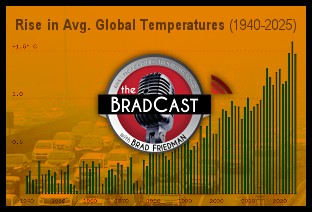 'Let Kids with Asthma Suffer': Trump to Reverse EPA's Landmark 'Endangerment Finding': 'BradCast' 2/11/26
'Let Kids with Asthma Suffer': Trump to Reverse EPA's Landmark 'Endangerment Finding': 'BradCast' 2/11/26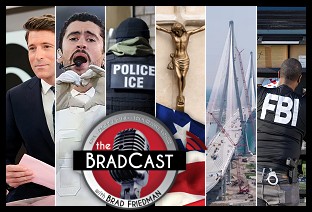 Trump's Presidency Now About Little More Than Racism, Corruption, Culture War Nonsense: 'BradCast' 2/10/26
Trump's Presidency Now About Little More Than Racism, Corruption, Culture War Nonsense: 'BradCast' 2/10/26 'Green News Report' 2/10/26
'Green News Report' 2/10/26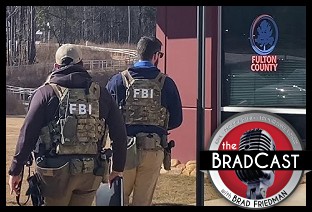 About Trump's FBI Raid of the Fulton County, GA Elections Warehouse: 'BradCast' 2/9/26
About Trump's FBI Raid of the Fulton County, GA Elections Warehouse: 'BradCast' 2/9/26 Sunday 'Dead in Darkness' Toons
Sunday 'Dead in Darkness' Toons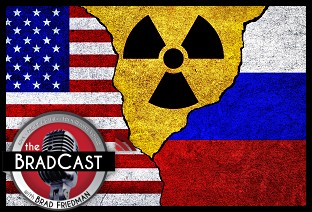 'New START' Treaty Allowed to End Amid New World Disorder: 'BradCast' 2/5/26
'New START' Treaty Allowed to End Amid New World Disorder: 'BradCast' 2/5/26 'Green News Report' 2/5/26
'Green News Report' 2/5/26 Trump Turns 'War on Terror' Tools Against Domestic Political Foes: 'BradCast' 2/4/26
Trump Turns 'War on Terror' Tools Against Domestic Political Foes: 'BradCast' 2/4/26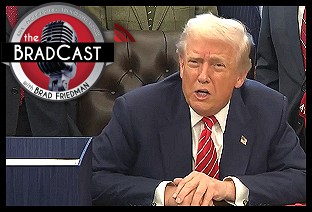 Losing Legally and Politically, Trump Threatens to 'Nationalize' Elections: 'BradCast' 2/3/26
Losing Legally and Politically, Trump Threatens to 'Nationalize' Elections: 'BradCast' 2/3/26 'Green News Report' 2/3/26
'Green News Report' 2/3/26 Bad and Good Bunnies, and an Electoral Shock in Deep 'Red' TX: 'BradCast' 2/2/26
Bad and Good Bunnies, and an Electoral Shock in Deep 'Red' TX: 'BradCast' 2/2/26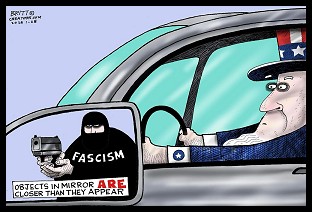 Sunday 'Mirror, Mirror' Toons
Sunday 'Mirror, Mirror' Toons 'Green News Report' 1/29/26
'Green News Report' 1/29/26 It's About Elections and the Windmills of His Mind: 'BradCast' 1/29/26
It's About Elections and the Windmills of His Mind: 'BradCast' 1/29/26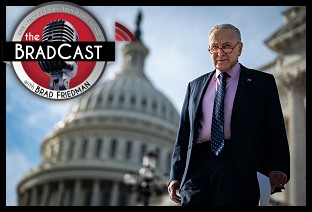 Govt Shutdown Over ICE Funding Near Certain This Weekend: 'BradCast' 1/28/26
Govt Shutdown Over ICE Funding Near Certain This Weekend: 'BradCast' 1/28/26 Trump Blinks, Bovino Out, MN Op Falters, Persists as Midterms Loom: 'BradCast' 1/27
Trump Blinks, Bovino Out, MN Op Falters, Persists as Midterms Loom: 'BradCast' 1/27  The ICE Murder of ICU Nurse Alex Pretti and the Heroes of Mpls: 'BradCast' 1/26/26
The ICE Murder of ICU Nurse Alex Pretti and the Heroes of Mpls: 'BradCast' 1/26/26  The BRAD BLOG: 22 Years and Still Counting
The BRAD BLOG: 22 Years and Still Counting Mr. Smith Testifies (Publicly) in Washington: 'BradCast' 1/22/26
Mr. Smith Testifies (Publicly) in Washington: 'BradCast' 1/22/26 World Turning Against Self-Destructing U.S. Under Trump: 'BradCast' 1/21/26
World Turning Against Self-Destructing U.S. Under Trump: 'BradCast' 1/21/26 Trump Waste, Fraud, Abuse on Voting, at DOJ, by DOGE: 'BradCast' 1/20/26
Trump Waste, Fraud, Abuse on Voting, at DOJ, by DOGE: 'BradCast' 1/20/26
 VA GOP VOTER REG FRAUDSTER OFF HOOK
VA GOP VOTER REG FRAUDSTER OFF HOOK Criminal GOP Voter Registration Fraud Probe Expanding in VA
Criminal GOP Voter Registration Fraud Probe Expanding in VA DOJ PROBE SOUGHT AFTER VA ARREST
DOJ PROBE SOUGHT AFTER VA ARREST Arrest in VA: GOP Voter Reg Scandal Widens
Arrest in VA: GOP Voter Reg Scandal Widens ALL TOGETHER: ROVE, SPROUL, KOCHS, RNC
ALL TOGETHER: ROVE, SPROUL, KOCHS, RNC LATimes: RNC's 'Fired' Sproul Working for Repubs in 'as Many as 30 States'
LATimes: RNC's 'Fired' Sproul Working for Repubs in 'as Many as 30 States' 'Fired' Sproul Group 'Cloned', Still Working for Republicans in At Least 10 States
'Fired' Sproul Group 'Cloned', Still Working for Republicans in At Least 10 States FINALLY: FOX ON GOP REG FRAUD SCANDAL
FINALLY: FOX ON GOP REG FRAUD SCANDAL COLORADO FOLLOWS FLORIDA WITH GOP CRIMINAL INVESTIGATION
COLORADO FOLLOWS FLORIDA WITH GOP CRIMINAL INVESTIGATION CRIMINAL PROBE LAUNCHED INTO GOP VOTER REGISTRATION FRAUD SCANDAL IN FL
CRIMINAL PROBE LAUNCHED INTO GOP VOTER REGISTRATION FRAUD SCANDAL IN FL Brad Breaks PA Photo ID & GOP Registration Fraud Scandal News on Hartmann TV
Brad Breaks PA Photo ID & GOP Registration Fraud Scandal News on Hartmann TV  CAUGHT ON TAPE: COORDINATED NATIONWIDE GOP VOTER REG SCAM
CAUGHT ON TAPE: COORDINATED NATIONWIDE GOP VOTER REG SCAM CRIMINAL ELECTION FRAUD COMPLAINT FILED AGAINST GOP 'FRAUD' FIRM
CRIMINAL ELECTION FRAUD COMPLAINT FILED AGAINST GOP 'FRAUD' FIRM RICK SCOTT GETS ROLLED IN GOP REGISTRATION FRAUD SCANDAL
RICK SCOTT GETS ROLLED IN GOP REGISTRATION FRAUD SCANDAL VIDEO: Brad Breaks GOP Reg Fraud Scandal on Hartmann TV
VIDEO: Brad Breaks GOP Reg Fraud Scandal on Hartmann TV RNC FIRES NATIONAL VOTER REGISTRATION FIRM FOR FRAUD
RNC FIRES NATIONAL VOTER REGISTRATION FIRM FOR FRAUD EXCLUSIVE: Intvw w/ FL Official Who First Discovered GOP Reg Fraud
EXCLUSIVE: Intvw w/ FL Official Who First Discovered GOP Reg Fraud GOP REGISTRATION FRAUD FOUND IN FL
GOP REGISTRATION FRAUD FOUND IN FL

































